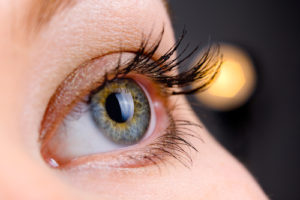
You might think that because your vision is fine that your eyes are healthy, but visiting your eye doctor for a comprehensive dilated eye exam is the only way to be absolutely certain. During your visit, both of your eyes will be closely examined for any signs of vision problems or eye diseases. The dilation of your eyes is a very important part of your comprehensive eye exam as it helps your doctor to get a clear picture of both your eye health and your overall well-being.
What happens during the dilated eye exam?
The eye dilation procedure is a simple one in which special eye drops are administered that cause your pupils to become larger. This makes it easier for your doctor to see the back of the eye, such as the retina and optic nerve. It takes about 15 to 20 minutes for pupils to fully dilate. The dilating eye drops may cause your eyes to sting. They may also cause you to experience a medicine taste in your mouth.
Once your pupils are dilated, your doctor will shine a bright light into your eyes to see various parts of the back of the eye. You’ll be asked to look up, down, left and right while the examination is performed to get a full 360-degree view..
Eye dilation helps your doctor see the inside of your eye entirely, including the macula (the center point of your vision) as well as your optic nerve, which sends messages from your eyes to your brain. Your eye doctor will look for signs of damage to the blood vessels in your eye that can be caused by diabetes and high blood pressure and will examine your optic nerve for signs of glaucoma.
Other conditions that can be detected during your dilated eye exam include retinal tears or detachments, diabetic retinopathy, macular degeneration, and other potentially serious eye diseases and conditions.
What happens after my dilated eye exam?
Depending on the type of drops used, dilation may last for several hours. After your exam, you may notice sensitivity to light or that your vision is blurry. You may want to wear sunglasses to help protect your eyes from bright light.
Who should have a dilated eye exam?
Annual comprehensive dilated eye exams are generally recommended for all ages but becomes increasingly important after age 40. Some Patients may require more frequent eye exams due to family history of eye disease, concurrent medical issues, or certain medication use.
When determining the necessity of eye dilation, your doctor will take these factors into consideration:
Any complaints or symptoms. Certain symptoms may require a dilated eye exam to determine their cause. Some conditions requiring follow-up exams may not need dilation during every visit unless there are new concerns or symptoms.
Your age. It is recommended that people age 40 and older have a dilated eye exam once a year, because the risk of eye diseases increases with age.
Your overall health. Certain diseases, like diabetes, increase the risk of developing eye disease.
Your eye health. Having a history of eye diseases that affect the back of the eye, such as retinal detachment, can increase your risk of other problems.
Schedule an appointment with the experienced eye doctors at Washington Eye Physicians and Surgeons for a comprehensive dilated eye exam to be sure your eyes are 100% healthy.
© 2024 Washington Eye Physicians & Surgeons
The material contained on this site is for informational purposes only and is not intended to be a substitute for professional medical advice, diagnosis, or treatment. Always seek the advice of your physician or other qualified health care provider.